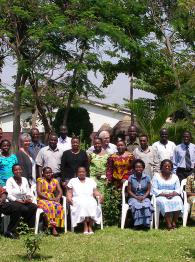
About the Project
This project is one of the 2011 WISE Awards finalists.
The Early Childhood Development Virtual University (ECDVU) is an educational leadership program that supports countries in Sub-Saharan Africa to address the care and development needs of their young children. It is a graduate-level university program, but its primary focus is on supporting the development of policies, programs, education and services “on the ground” in participating countries.
The program accomplishes these goals through working with key, country-identified individuals who are in a position to address their country’s objectives. Its educational process forges a multi-country “community of learners and leaders” who work together to advance child-focused goals. The program engages with the participants through online and face-to-face delivery of courses specifically designed for African and international development contexts. Participants continue with their in-country employment and share their learning broadly within their home countries. Innovative policies, programs, training opportunities and other developments initiated by the university students impact from hundreds to millions within and across participating countries.
Context and Issue
A key to addressing leadership needs in African Early Childhood Development is to move beyond costly out-of-country and bricks-and-mortar institutional approaches to a virtual university that:
- is inclusive of – and interactive with – communities at national, district and local levels
- includes widely respected early childhood development faculty from across Africa and around the world, working in concert with local mentors and leaders; and
- promotes a synergy across initiatives and across early childhood development partner organizations through the continuity and interactivity of a leadership cohort stimulated by a shared and creative vision of the subject in Africa.
The importance of the early years, both for individual development and for broader socio-economic development, is well-established. Concerns regarding children’s early development are perhaps nowhere greater than in Sub-Saharan Africa, yet the capacity to respond to these needs is severely limited. The need for creative and resourceful leaders who can bridge the evidence of science and the realities of communities to develop policies, promote programs and support training is evident across the continent.
Solution and Impact
The approach taken by the organization in Africa builds on the project holder’s earlier work with indigenous communities in Canada – an approach called “generative curriculum”, which was recognized by UNESCO as a best practice in indigenous education. The generative curriculum respects the importance of diverse sources of knowledge: internationally published as well as local materials. This philosophy is then incorporated into a combined online and face-to-face approach to education and the creation of an on-going community of professional learners and leaders. The program’s success relies on the three following aspects:
- Local Goals/Local Leaders: Participants are nominated by inter-sectoral, country ECD committees that have identified goals and objectives for the country;
- No Brain Drain: Participants continue with their in-country employment during the delivery of the program; 95 percent graduate and 99 percent have remained in Africa;
- Cost-Effective: An external evaluation indicated that the advertised per-student cost for a leadership program in North America would be approximately double the ECDVU cost, even before comparisons are made on a per-completion of program (95 percent for ECDVU), and contribution through work in Africa (99 percent for ECDVU).
So far, the impacts of the program are as numerous as its graduates. For example: in Malawi, graduates developed national policies for early childhood development and extended education and program development to districts; in Nigeria, graduates have established over a dozen ECD education programs in colleges, created a Ph.D. program, adapted and approved a Graduate Diploma program based on the ECDVU; in The Gambia, indigenous play workshops were held throughout the country; in Tanzania, an innovative national early childhood development network was established. The ECDVU network has also helped mount African conferences on ECD. The third conference led to the publication of the first African-edited volume on ECD (Garcia, Pence & Evans, 2008).
While the ECDVU students advance their education and employability skills, the primary beneficiaries of the program are not the students themselves, but those in their countries who benefit from the creation of new policies, programs, practices, research and training by the ECDVU participants. To date, the program has benefited directly 106 graduates from 16 SSA countries and 26 from MENA. An immeasurable number of children and families are now being positively affected by the actions of these graduates.
Future Developments
Africa is now at a critical point where post-secondary institutions must be supported to assume greater early childhood development leadership responsibilities, both for education/training, and for African-led research. To better clarify next steps, the ECDVU worked with UNICEF and UNESCO regional offices to conduct surveys to determine which post-secondary institutions in Sub-Saharan Africa offer child development and early childhood development courses and programs. That information is being used to pursue the steps identified below.
Based in part on survey findings, the ECDVU approached various donors to support an African Scholars workshop. This was followed by a southern Africa regional proposal development workshop. Such cooperative multi-country proposal development workshops are much needed for other regions as well. The proposals that will be forthcoming will require a level of funding that has not been available to date for Sub-Saharan Africa. The ECDVU is currently meeting with donors to create a fund to support African-led research, and to enhance African-led education and training.
Replication of the initiative is currently in process. The University of Ibadan in Nigeria has recently approved a Graduate Diploma adapted from the ECDVU program. Discussions are also being held with universities in Ghana, Senegal, Tanzania and Malawi.


